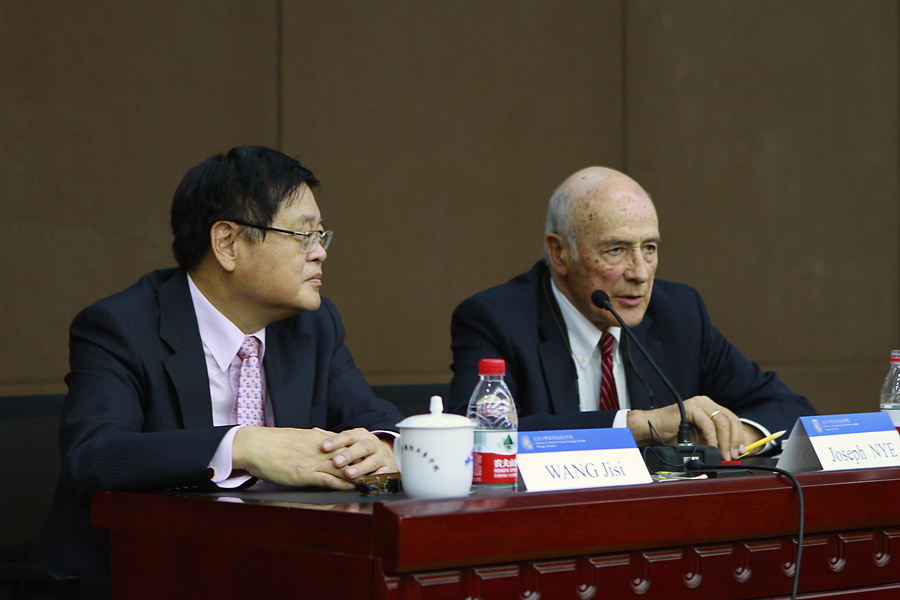
On October 21st, 2016, Joseph Nye, the Distinguished Service Professor of Harvard University attended the third North Pavilion Dialogue held by the Institute of International and Strategic Studies IISS, Peking University (PKU) on invitation and delivered a speech entitled “Is the American Century Over?” The lecture was chaired by Prof. Wang Jisi, President of IISS. Nearly 500 teachers, students and scholars participated in the event.
The concept of "American Century" was first proposed by a journalist in 1941 to encourage Americans to participate in World War II. By reviewing the process from the beginning of the 20th century when the United States became the world's largest economy to the 1930s when the United States refused to provide public goods and then to the 1940s when the United States gradually became involved in global affairs, Prof. Nye argued that the provision of global public goods for the world is critical whether it was the British Century or the American Century.
Nye pointed out that "the decline of the United States" has been repeatedly discussed since the birth of the United States. He distinguished the concept of "absolute decline" from that of "relative decline", believing that absolute decline refers to a state of decline from within as in ancient Rome, whereas a relative decline refers to a state with moderate development while other countries develop better. When talking about relative decline, the United States does have a lot of trouble, but they did not cause the absolute decline of the United States. The United States is still a global leader in institutional and scientific and technological innovation, energy use, higher education and other fields.
By comparing China and the United States in terms of strength from different dimensions, Nye holds that although China may surpass the US in total economy in the near future, but compared with the US, China still has a long way to go in per capita GDP, military strength and soft power. He also pointed out that the simple analogy of the rise of Germany and its eventual preponderance over the United Kingdom may lead to the fear of United States towards the rise of China. In fact, there is no need for the United States to worry about this. In 1900, Germany has surpassed Britain in the index of industrial production, but now China has not surpassed the United States in this regard, so the United States needs not to worry about troubles of its own imagining. Moreover, there are many opportunities for the two countries to develop good bilateral relations, so the two sides should move in the direction towards mutual cooperation. For example, China and the United States could jointly address climate change, safeguard cyber security, combat terrorism, and provide public goods for the world.
In the Q & A session, Nye said the United States should welcome the rise of China, and the two countries should carry out cooperation in many areas where they can both benefit. He also talked about the US policy toward China in the 1990s, when many advocated a policy of containment against the rising China, but President Clinton thought the United States could benefit more from a strong China, which became the foundation of US strategy toward China.
Prof. Nye’s simple but profound explanation won the warm applause from the audience.
Prof. Joseph Nye was born in 1937 and has received his education at Princeton University, Oxford University, and Harvard University. In 1964, he received his doctorate in political science from Harvard University and began to teach at Harvard University. He once served as Assistant Secretary of State for Carter Administration, Chairman of the National Intelligence Committee of the Clinton Administration and Assistant Secretary of Defense. After returning to Harvard University, he served as president of the Kennedy School of Government, and is now Harvard University Distinguished Service Professor and a scholar with major influence in international relations.
This speech is part of a series of activities staged during the third North Pavilion dialogue. The North Pavilion dialogue is held every fall by IISS, PKU, including retreat seminars, public forums and seminars and a series of lectures. The title of the North Pavilion dialogue this year is Global Governance: the reinforcement and reform of the role of the international mechanism. In addition to Prof. Joseph Nye, the foreign guests also include Kevin Rudd, Former Prime Minister of Australia; David Miliband, Former Minister of Foreign Affairs of the United Kingdom; Andrey Kortunov, Director General of the Russian International Affairs Council; Shivshankar Menon, Former National Security Advisor to the Prime Minister of India; Kim Sung-Hwan, Former Minister of Foreign Affairs of Korea; Yoriko Kawaguchi, Former Minister of Foreign Affairs of Japan; George Yeo, Former Minister of Foreign Affairs of Singapore; Nabil Fahmy, Former Minister of Foreign Affairs of Egypt; John Negroponte, Former Deputy Secretary of State of the United States; Marty Natalegawa, Former Minister of Foreign Affairs of Indonesia; Thierry de Montbrial, President, French Institute of International Relations (IFRI); Volker Perthes, Executive Chairman and Director of Stiftung Wissenschaft und Politik and many other renowned former politicians and strategists from all over the world.

